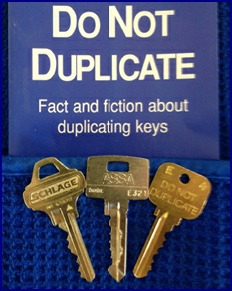
Unauthorized key duplication is the single-
Fact or Fiction:
Keys stamped “do not duplicate” are protected by law. FICTION
Many keys are stamped “do not duplicate” as a request to their holder. There is no legal connection or consequences. FACT
Companies offering “restricted” keys mean that locksmiths or key cutters are not allowed to duplicate them. FICTION
Most companies offer “restricted” keys. However, this term refers to that company’s distribution policy on the key and has nothing to do with duplication rights. Most restricted keys are easily duplicated. FACT
Keys for all “high-
Only the key blank can be protected from unauthorized manufacturing, and then only
if the key blank itself is patented. Purchasers of “high-
Most key cutters will ask questions about your key and will normally comply with any warning or request not to duplicate that key. FICTION
Only professional locksmiths will honor such requests if they are familiar with the
manufacturer. Non-
